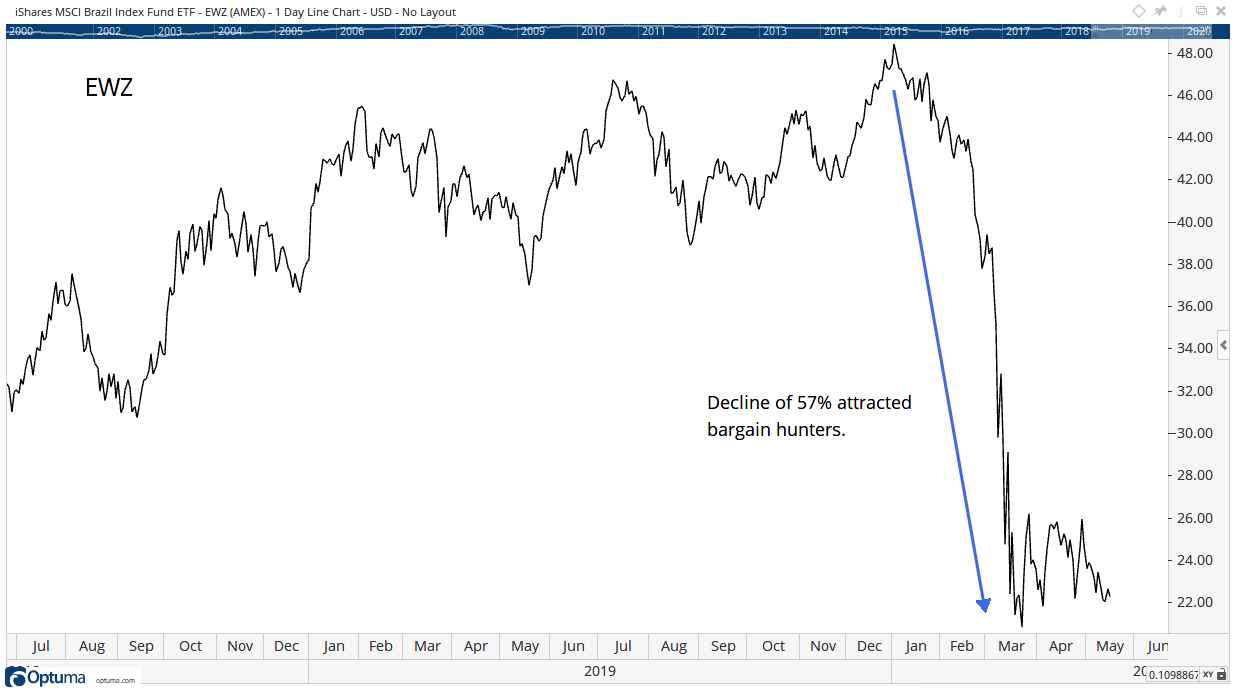“My investment advice would be not to run into a burning building.”
That could be the single most important piece of investment advice ever offered, yet few will ever see it.
That quote is from a New York Times article called “Another Health Minister in Brazil Exits Amid Chaotic Coronavirus Response.”
It’s a quote from an economist with Gavekal Research and was originally in a paper outlining Brazil’s challenges amid the pandemic. The conclusion is that “Right now, Brazil is best left to the specialists, crazies, long-term opportunists and those without other options.”
While that’s all specific to Brazil, it applies to many ideas at various times. Let’s first look at Brazil, and then generalize to other markets.
Investment Advice: How to Expose False Flag Value
The chart below shows iShares MSCI Brazil Capped ETF (NYSE: EWZ). The pattern is familiar to bargain hunters.

Source: Optuma
Bargain hunters look at prices. They apply seemingly bulletproof logic. In this case, the argument is “investors were paying $48 for EWZ in December. Now, at $20, it’s a steal.”
This argument ignores the reality that the world changed as prices fell. Earnings prospects are lower and stocks are worth less. Long-term prospects are uncertain, another factor justifying lower prices.
Those new realities apply not just to Brazil. Right now, bargain hunters are considering many stocks in the in U.S. markets.
Over 1,140 stocks are trading at least 57% below their 52-week highs. That’s about 15% of all publicly traded companies.
Some investors think if a stock traded at $10, it must be a bargain at $4. Oftentimes, they call themselves “value investors.”
Value investing requires exceptional research, a la Warren Buffett’s M.O. In the example of Brazil, research includes studying the impact of the coronavirus and the prospects of economic recovery as crime is rising in the country. It’s a complex problem that many bargain hunters ignore.
As the Gavekal economist noted, “Right now, Brazil is best left to the specialists, crazies, long-term opportunists and those without other options.”
The same is true for the U.S. stocks that didn’t participate in the recovery yet. The same is always true for beaten-down investments.
Despite this truth, some investors will always run into burning buildings. Before doing so, you should ask what special knowledge you have that will guide you out of the fire.
• Michael Carr is a Chartered Market Technician for Banyan Hill Publishing and the Editor of One Trade, Peak Velocity Trader and Precision Profits. He teaches technical analysis and quantitative technical analysis at New York Institute of Finance. Mr. Carr also is the former editor of the CMT Association newsletter Technically Speaking.
Follow him on Twitter @MichaelCarrGuru




